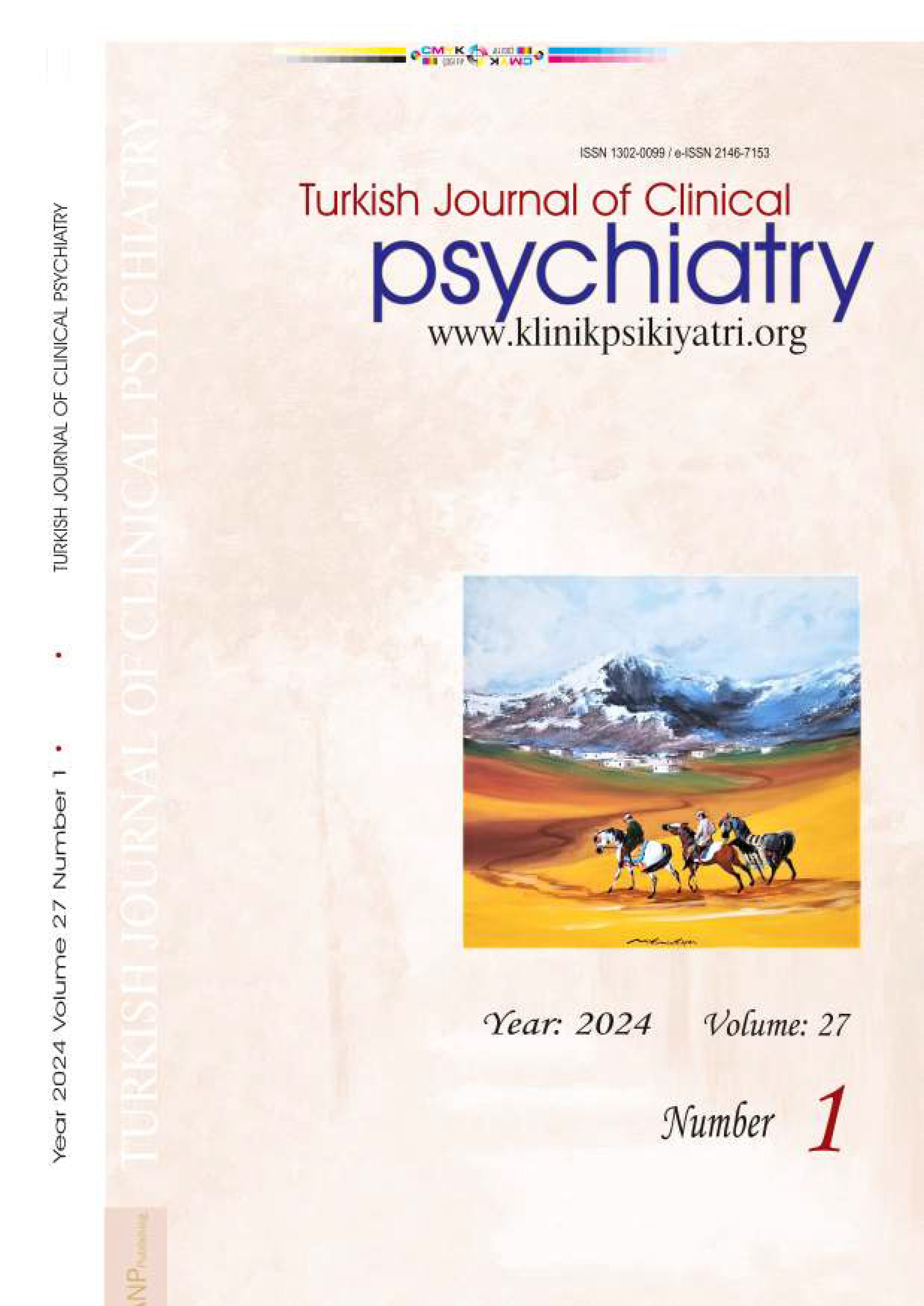
The relationship between childhood trauma and dysfunctional attitudes in individuals with unipolar depression
Sibel Kahraman Girgeç1, Özge Saraçlı2, Vildan Çakır Kardeş21Abdulkadir Yuksel State Hospital, Gaziantep2Zonguldak Bulent Ecevit University Faculty Of Medicine, Department Of Mental Health And Diseases, Zonguldak
INTRODUCTION: This study aims to investigate the relationship between childhood trauma and dysfunctional attitudes in individuals diagnosed with unipolar depression.
METHODS: Two hundred patients diagnosed with unipolar depression were included in the study and comorbid diagnoses were determined with the help of a structured clinical interview (SCID-I) for DSM-IV axis-I disorders. Sociodemographic data form, Beck Depression Inventory (BDI), Beck Anxiety Inventory (BAI), Childhood Trauma Questionnaire (CTQ), and Dysfunctional Attitude Scale (DAS) were applied to the individuals included in the study.
RESULTS: More than half (66,5%) of the individuals followed up due to unipolar depression had childhood trauma, the most common childhood trauma was emotional neglect (%57,5). While there was a positive correlation between DAS total score and physical neglect (p=0,027, r=0,205), emotional abuse(p=0,007, r=0,208) and physical abuse(p=0,039, r=0,124) score, there was a positive correlation between DAS independent attitude and emotional neglect(p=0,044, r=0,223), physical neglect(p=0,007, r=0,205) and emotional abuse(p=0,010, r=0,173), and a positive correlation between DAS perfectionism and emotional abuse(p=0,010, r=0,219) and physical abuse(p=0,029, r=0,139). In the logistic regression analysis, in the age-adjusted model, it was determined that the number of depressive episodes in those with CTQ was 1.39 times (p=0.02, 95% CI= 1.04-1.85) higher than in those without CTQ.
DISCUSSION AND CONCLUSION: As far as we know, it is one of the rare studies in the literature examining the relationship between DAS subscales and childhood trauma subscales. It was found that physical and emotional neglect from childhood traumas was associated with the development of an independent dysfunctional attitude, and emotional and physical abuse was associated with the development of a perfectionist dysfunctional attitude. We believe that addressing cognitive distortions in the light of this information in the follow-up and treatment of these patients may contribute positively to treatment response and prognosis.
Unipolar depresyon tanılı bireylerde çocukluk çağı travmaları ile fonksiyonel olmayan tutumların ilişkisi
Sibel Kahraman Girgeç1, Özge Saraçlı2, Vildan Çakır Kardeş21Abdulkadir Yüksel Devlet Hastanesi, Gaziantep2Zonguldak Bülent Ecevit Üniversitesi Tıp Fakültesi, Ruh Sağlığı Ve Hastalıkları Ana Bilim Dalı, Zonguldak
GİRİŞ ve AMAÇ: Bu çalışmada; unipolar depresyon tanılı bireylerde çocukluk çağı travmaları ile fonksiyonel olmayan tutumların ilişkisinin araştırılması amaçlanmıştır.
YÖNTEM ve GEREÇLER: Çalışmaya unipolar depresyon tanılı 200 hasta dâhil edildi ve DSM-IV eksen-I bozuklukları için yapılandırılmış klinik görüşme (SCID-I) uygulanarak eş tanılar belirlendi. Çalışmaya alınan bireylere sosyodemografik veri formu, Beck Depresyon Ölçeği (BDÖ), BeckAnksiyete Ölçeği (BAÖ), Çocukluk Çağı Travmaları Ölçeği (ÇÇTÖ) ve Fonksiyonel Olmayan Tutumlar Ölçeği (FOTÖ) uygulandı.
BULGULAR: Unipolar depresyon nedeniyle takipli bireylerin yarısından fazlasında (%66,5) çocukluk çağı travması mevcuttu, en sık görüleni duygusal ihmaldi (%57,5). FOTÖ toplam puanı ile fiziksel ihmal(p=0,027, r=0,205), duygusal istismar(p=0,007, r=0,208) ve fiziksel istismar(p=0,039, r=0,124) puanı arasında pozitif yönde korelasyon bulunurken, FOTÖ bağımsız tutum ile duygusal ihmal(p=0,044, r=0,223), fiziksel ihmal(p=0,007, r=0,205) ve duygusal istismar(p=0,010, r=0,173) arasında pozitif yönde korelasyon, FOTÖ mükemmelci tutum ile duygusal istismar(p=0,010, r=0,219) ve fiziksel istismar(p=0,029, r=0,139) arasında pozitif yönde korelasyon mevcuttu. Lojistik regresyon analizinde yaşa göre düzeltilmiş modelde, ÇÇT olanların olmayanlara göre geçirilmiş depresif atak sayısının 1,39 kat (p=0,02, %95 CI= 1,04- 1,85) daha fazla olduğu bulundu.
TARTIŞMA ve SONUÇ: Bildiğimiz kadarıyla FOTÖ alt ölçekleri ile çocukluk travmaları alt ölçekleri arasındaki ilişkiyi inceleyen literatürdeki nadir çalışmalardan biridir. Çocukluk çağı travmalarından fiziksel ve duygusal ihmalin bağımsız fonksiyonel olmayan tutumun gelişmesiyle, duygusal ve fiziksel istismarın ise mükemmelci fonksiyonel olmayan tutumun gelişmesiyle ilişkili olduğu bulundu. Bu hastaların takip ve tedavisinde bilişsel çarpıtmaların bu bilgiler ışığında ele alınmasının tedavi yanıtı ve prognoza olumlu katkılar sağlayabileceğini düşünmekteyiz.
Manuscript Language: Turkish
(542 downloaded)




